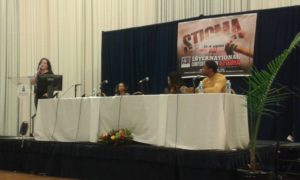By Sytonia Reid, Contributing Writer
Posted 2:00 PM EST, Tues., Nov. 12, 2016
The International Conference on Stigma is an annual program addressing the debilitating impact stigma tied to certain health conditions has on our communities. Hosted by Howard University’s Department of Pediatrics and Child Health, in collaboration with the Coalition for Elimination of AIDS-related Stigma (CEAS), this year’s seventh annual conference proved to be emotional and informative for many on Friday, Nov. 18.
Focusing on the stigma associated with mental health and HIV/AIDS, the nine-hour conference opened an in-depth conversation up to medical experts and non-experts alike, which explored not only the physical consequences of certain health conditions, but their social implications as well.
“Being isolated and alone can kill you faster than any virus can,” said Sasanka Jinadasa, Capacity Building Manager at HIPS. HIPS is an organization in Washington, D.C. that helps individuals involved in sex work by providing counseling and health care services.
This year’s conference placed heavy emphasis on combating the stigma associated with HIV and AIDS. Among the topics covered were the unhealthy consequences of anticipated stigma, myths surrounding HIV contraction and same sex relationships, aging with HIV, issues facing HIV-positive women and criminalization. Adorned with red ribbons, many crowd members shared personal testimonies, posed questions to panelists, and networked with other anti-stigma advocates.
Nicole Seguin, a panelist and Positive Women’s Network secretary, became visibly emotional as she retold her own experiences with stigma to the audience.

Nicole Seguin, Positive Women’s Network secretary, speaks during 7th Annual International Conference on Stigma
held at Howard University on Friday, Nov. 18. (Photo Credit: Sytonia Reid, Contributing Writer/The Hilltop)
“Every time in an emergency room, I have to educate you on how to treat me,” Seguin continued. “If you’re a doctor or student, or into [public] health, just be a healer and not a hurter.”
Research presented at the conference showed a strong association between anticipated stigma and intensified HIV physical symptoms. Likewise, anticipated stigma is identified by the World Health Organization as a main deterrent from getting tested for many individuals.
“We validated this original genesis of it which is fear. That’s the original genesis of stigma around infectious diseases, it’s like ‘you stay over there, because I don’t want what you have,’” said Victoria Frye, Associate Medical Professor at the City College of New York. “When you reflect back to someone that you understand that but ‘let me give you the information that might help you change how you think about that,’ then they’re more willing to hear you.”
Howard students also brainstormed on ways stigma can be eradicated on our own campus community.
“Howard is a very Black space, it’s a very melanin-inclusive space, so a lot of our things tend to be melanin-related, and within the Black community there are very heteronormative things that we kind of push” said Chelsea Nnebe, a senior chemistry major from New Jersey by way of Nigeria.
“Today I heard somebody say something as basic as ‘don’t yuck my yum’ and that to me makes so much sense,” explained Nnebe. “Having a full range of things kind of allows people to connect to different parts of their life that may not necessarily have to do with the major theme of the conference but still is just very inclusive.”
“I think it really needs to start with campus organizations being more inclusive,” said Victoria Russell, junior finance major from Swedesboro, New Jersey. “Some people talk about what they want to do and others actually put it into action. So I think that’s more important for Howard students to be involved.”

